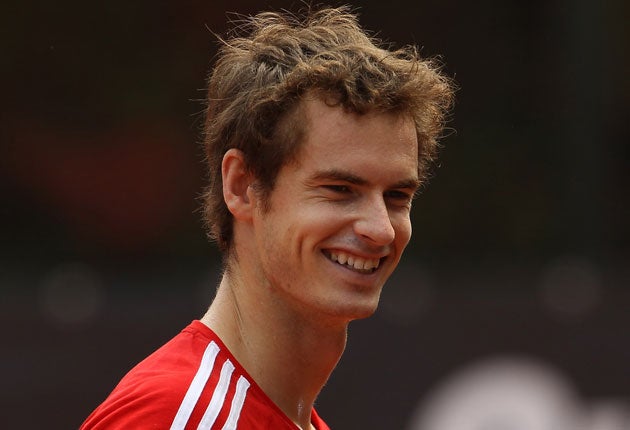Murray to face 'Federer of the Futures' first up

It is something of a double-edged compliment, but Eric Prodon, Andy Murray's first-round opponent here at the French Open, is known as "the Roger Federer of the Futures". The 29-year-old Frenchman got to his first final in 2001, won his first tournament in 2004 and has enjoyed consistent success ever since, reaching a total of 38 finals and winning 21 titles along the way.
The major dent in the world No 118's reputation, however, is the fact he has spent almost his entire career on the Futures and Challenger circuits, a twilight world populated by up-and-coming talent and those not quite good enough to make it on to the main Association of Tennis Professionals tour.
Places like Monte Carlo and Melbourne have never featured on Prodon's schedule. Instead he has won tournaments at Marrakech, Bucaramanga in Colombia and Brasov in Romania, while the list of players he has beaten in finals – including Farrukh Dustov, Adrian Menendez-Maceiras, Fernando Romboli, Catalin Gard, Axel Michon and Marius Zay – is hardly a who's who of international tennis.
A different future had beckoned for Prodon in 1998, when he played at the Eddie Herr tournament in Florida, which brings together nearly all the world's best juniors. Prodon lost to David Nalbandian in the final, having beaten Roger Federer and Guillermo Coria in earlier rounds. He went on to beat Mikhail Youzhny at the Orange Bowl and Jarkko Nieminen and Tommy Robredo before leaving the junior circuit the following year.
It was hardly for want of trying, but Prodon was unable to match that success as a pro. He has only played 10 matches on the main tour, winning one. He has been awarded three wild cards at Roland Garros, only to lose on each occasion. This time he has done it the hard way, winning three matches in qualifying to reach the main draw.
Having been out for nearly two years after breaking a bone in his foot, Prodon now plays nearly all his matches on clay, which is more forgiving than hard courts. In recent times he has enjoyed more success, having reached a career-high No 113 in the world rankings earlier this month.
Murray, nevertheless, should have little difficulty progressing to the second round, where one of two more qualifiers, Italy's Simone Bolelli (world No 129) or Canada's Frank Dancevic (No 179), await. Thereafter the challenges get tougher, with Murray seeded to meet Milos Raonic, who in the last 12 months has climbed 275 places in the world to No 28, Viktor Troicki and Jürgen Melzer en route to a semi-final clash with Rafael Nadal.
In his four appearances here, Murray has never gone beyond the quarter-finals, but his form in the current clay-court season gives the 24-year-old Scot hope that he can go deep into the tournament.
Despite playing with an elbow injury, Murray became the first player on clay this year to take a set off Nadal in Monte Carlo, while in Rome last weekend he came closer to beating Novak Djokovic than anyone in 2011. The world No 4 served for the match at 5-4 in the deciding set before losing in a tie-break.
The Rome performance gave Murray encouragement. "It was important because I felt like I was starting to play good tennis again," the Scot said here. "I was working things out on the court. I had been behind 6-1 and managed to find my way back. I changed my game a bit. That's important: that you can keep focusing and thinking when you're behind."
While Murray is the only British man in the main singles draw, three women have made it. Elena Baltacha (world No 83) and Anne Keothavong (No 108) are here thanks to their rankings, while Heather Watson (No 119) became the first British woman to come through qualifying for 33 years. All three have winnable first-round ties. Baltacha plays Sloane Stephens of the US, Keothavong meets Russia's Vesna Dolonts and Watson faces Stéphanie Foretz Gacon of France.
Join our commenting forum
Join thought-provoking conversations, follow other Independent readers and see their replies
Comments